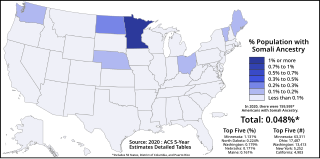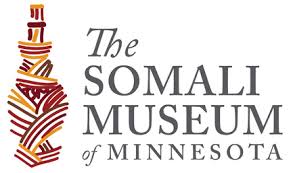
Galkayo is the third-largest city in Somalia which serves as the capital of the north-central Mudug region.

The Majeerteen, alternately known as MohammedHarti, are a prominent Somali sub-clan of the Harti, which falls under the Darod conglomerate of clans. Traditionally, they inhabit extensive territories in the Bari, Nugaal, and Mudug regions of Somalia, spanning from Bosaso to Garacad, mainly in Puntland state. Additionally, Majeerteen populations are present in southern towns such as Kismayo.

Abdirizak Haji Hussein was a Somali diplomat and politician. He was the Prime Minister of Somali Republic from 14 June 1964 to 15 July 1967.

Dahabshiil is a Somali funds transfer company, and is the largest money-transfer business in Africa. It's headquartered in Burao, Somalia. Formed in 2004, the firm operates from over 24,000 outlets and employs more than 2,000 people across 126 countries. It provides financial services to international organisations, as well as to both large and small businesses and private individuals. The company is also involved in community building projects in Somalia.
The Hawadle are a Somali clan who trace descent to Meyle, one of the sons of Irir Samaale. The Hawadle, as well as many other Somali clans stem from Samaale.

Somali Americans are Americans of Somali ancestry. The first ethnic Somalis to arrive in the U.S. were sailors who came in the 1920s from British Somaliland. They were followed by students pursuing higher studies in the 1960s and 1970s, by the late 1970s through the late 1980s and early 1990s more Somalis arrived. However, it was not until the mid and late 1990s when the civil war in Somalia broke out that the majority of Somalis arrived in the United States. The Somali community in the U.S. is now among the largest in the Somali diaspora.
In United States law, providing material support for terrorism is a crime prohibited by the USA PATRIOT Act and codified in title 18 of the United States Code, sections 2339A and 2339B. It applies primarily to groups designated as terrorists by the State Department. The four types of support described are "training," "expert advice or assistance," "service," and "personnel."

Abdi Ismail Samatar is a Somali scholar, writer and professor of geography.
Shirwa Ahmed was a 26-year-old Somali-American who is the first known American Islamist suicide bomber. He detonated a car bomb in Somalia in October 2008, killing himself.

Abdi Warsame is a Somali-American politician in Minnesota's Democratic–Farmer–Labor Party. After moving to London as an asylum-seeker, he immigrated to Minnesota in 2006. In November 2013, he was elected to the Minneapolis City Council, becoming the first Somali official to be elected to the position. Warsame was reelected for a second term in 2017. He resigned from the position in 2020 to become the head of the Minneapolis Public Housing Authority.

Hussein Samatar was a Somali American politician, banker and community organizer. He established the African Development Center in 2004, which provided microloans and technical expertise to recent immigrant businesses.

Mohamud Noor is an American politician serving in the Minnesota House of Representatives since 2019. A member of the Democratic–Farmer–Labor Party (DFL), Noor represents District 60B, which includes parts of the city of Minneapolis in Hennepin County.

Saado Ali Warsame was a Somali-American singer-songwriter and politician. She served as a lawmaker in the Federal Parliament of Somalia representing Puntland State of Somalia in 2012 until her assassination. A prominent figure in traditional Somali music, her art and legislative work were centered on political and social justice. On July 23, 2014, she was shot to death by Islamists in Mogadishu.

The Somali Museum of Minnesota is a cultural institution in Minneapolis, Minnesota, United States. The Minneapolis–Saint Paul metro area is home to the largest Somali immigrant and refugee population in the United States, after civil war in Somalia prompted large-scale displacement of the Somali people. The Somali Museum of Minnesota presents a collection of more than 1000 traditional nomadic artifacts from Somalia, as well as educational programming about Somali culture, arts events, and cross-cultural activities. It may now be the only museum in the world dedicated to preserving Somali culture and traditions.

Ilhan Abdullahi Omar is an American politician serving as the U.S. representative for Minnesota's 5th congressional district since 2019. She is a member of the Democratic Party. Before her election to Congress, Omar served in the Minnesota House of Representatives from 2017 to 2019, representing part of Minneapolis. Her congressional district includes all of Minneapolis and some of its first-ring suburbs.

Samatar Crossing is a 1,850-foot (560 m), shared-use path and innovative urban redesign project in Minneapolis, Minnesota, United States. Posthumously named after Somali-American politician and activist Hussein Samatar, the crossing connects the Downtown East/Elliot Park and Cedar-Riverside neighborhoods via a former interstate highway ramp. The Samatar Crossing redevelopment project received national recognition when it opened in 2018.

The Farah Garad or the Garad Farah is a Somali clan which is part of the Dhulbahante clan-family, a sub-division of the larger Harti/Darod clan. The Farah Garad are divided into two sub-clans — Yassin Garad and Abdalla Garad. Abdalla has four clan eponyms, Ahmed Garad, Mohamed Garad (Baharsame), Guled Garad (Barkad) and Ali Garad. They are largely significant in Sool and Togdheer regions of Somaliland, and Dollo Somali region of Ethiopia.















